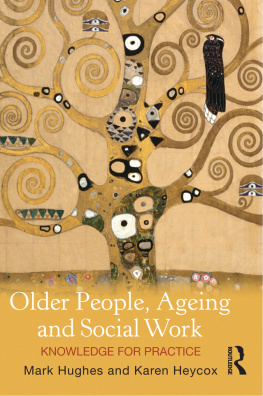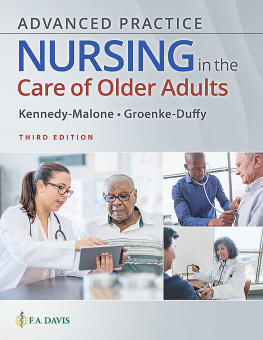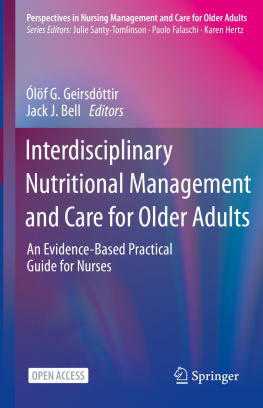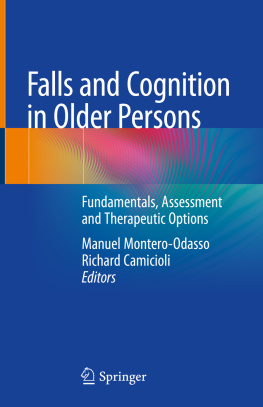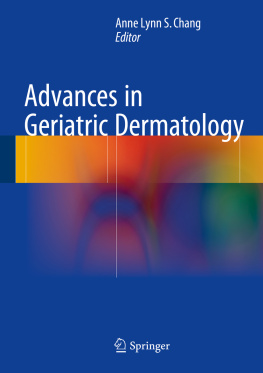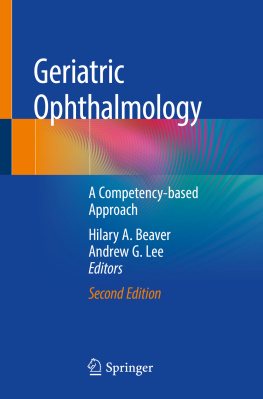
Geriatric Medicine: an evidence-based approach

Great Clarendon Street, Oxford, OX2 6DP,
United Kingdom
Oxford University Press is a department of the University of Oxford.
It furthers the Universitys objective of excellence in research, scholarship, and education by publishing worldwide. Oxford is a registered trade mark of Oxford University Press in the UK and in certain other countries
Oxford University Press 2014
The moral rights of the authors have been asserted
First Edition published in 2014
Impression: 1
All rights reserved. No part of this publication may be reproduced, stored in a retrieval system, or transmitted, in any form or by any means, without the prior permission in writing of Oxford University Press, or as expressly permitted by law, by licence or under terms agreed with the appropriate reprographics rights organization. Enquiries concerning reproduction outside the scope of the above should be sent to the Rights Department, Oxford University Press, at the address above
You must not circulate this work in any other form
and you must impose this same condition on any acquirer
Published in the United States of America by Oxford University Press
198 Madison Avenue, New York, NY 10016, United States of America
British Library Cataloguing in Publication Data
Data available
Library of Congress Control Number: 2014941934
ISBN 9780199689644
Printed in Great Britain by
Clays Ltd, St Ives plc
Oxford University Press makes no representation, express or implied, that the drug dosages in this book are correct. Readers must therefore always check the product information and clinical procedures with the most up-to-date published product information and data sheets provided by the manufacturers and the most recent codes of conduct and safety regulations. The authors and the publishers do not accept responsibility or legal liability for any errors in the text or for the misuse or misapplication of material in this work. Except where otherwise stated, drug dosages and recommendations are for the non-pregnant adult who is not breast-feeding
Links to third party websites are provided by Oxford in good faith and for information only. Oxford disclaims any responsibility for the materials contained in any third party website referenced in this work.
DedicationProf. Peter Crome
Peter Crome has worked in the National Health Service, academic institutions, and professional bodies since 1970. He has led the development of clinical and academic geriatric medicine in local, regional, national, and international arenas. As head of Keele Medical School, chair of the Geriatrics Committee of the Royal College of Physicians, president of the Section of Geriatrics and Gerontology of the Royal Society of Medicine, secretary general of the Clinical Section of the International Association of Geriatrics and Gerontology, and president of the British Geriatrics Society, he has given strategic direction to the development of geriatric medicine nationally and internationally.
Peter has inspired a generation of geriatricians by promoting clinical excellence, bringing a research ethos into every aspect of clinical practice, and encouraging others to develop a wider vision and positive approach. His influence has been pervasive. Through the Masters degree in Geriatric Medicine he founded at Keele University, academic seminars and conferences, and mentoring of students nationally and internationally, he has shaped a generation of geriatricians. As president of the British Geriatrics Society, he has been instrumental in changing the clinical specialty of elderly care into the academic discipline of geriatric medicine.
The chapters in this book are inspired by Peters interests and are written by experts in the field in celebration of his work. They reflect Peters wide influence within the specialty of geriatric medicine and the impact that he has had upon it. His research includes publications on pharmacokinetics in older people, stroke, dementia, involvement of older people in clinical trials, addiction, mental health, pain, and frailty, with seminal papers and book chapters in all of these fields. His interests have not just been theoretical. He has carried his studies through into improvements in clinical practice, undergraduate and postgraduate education, and policy implementation. Peter is not only an incisive thinker; he also has the ability of making things happen in complex circumstances and difficult situations.
No one who knows Peter can fail to appreciate his optimism, realism, humour, unfailing humanity, and his broad smile. However, most of all, he is a devoted doctor, a trusted colleague, and an intuitive mentor, always eager to be supportive and inclusive.
With all of Peters admirers it would have been possible to fill this book several times over. As it is, the chapters collected here will stand as a token of the affection and esteem in which he is held by all of his friends and colleagues.
Preface
While it is fashionable to lament the perceived future adverse impacts of increasing longevity on society, health care provision, and social services, such doom may be misplaced, as increased longevity is a consequence of better health, and life years gained may be productive and contented. While the recent increase in retirement age can be seen as a purely economic expedient, it also reflects the realities of better health in older people. Nevertheless, towards the end of life, at whatever age this occurs, frailty, memory loss, pain, and multimorbidity are likely to remain problems encountered in years to come as they are now. Evidence on the effectiveness of preventative and therapeutic interventions is increasing rapidly, and approaches to treatment of the older person are changing apace. With more age-related problems becoming treatable or preventable, simply caring for the elderly is no longer an option.
More than in any other specialty, the way the service is delivered and how support is provided in the community are important determinants of health and quality of life in this population, and new models of care are being developed.
This book will give the reader a grounding in current thinking in geriatric medicine, highlight the research which has led to changes in management strategies, point to key sources of up-to-date information on the topic, and probe into questions that still remain to be answered.
The contributors to the book are leading UK specialists in their subject areas. Chapters are written in a concise and economical style that conveys the latest evidence-based practice in the treatment of older people along with expert interpretation of the research literature from a specialists perspective. Learning points and illustrations are provided where relevant, as well as up-to-date references for further material, including useful websites.
The book is an easily accessible reference tool for a broad cross section of health professionals who manage older patients in both primary and secondary care, such as geriatricians, general practitioners, nurses, therapists, and clinical researchers, as well as specialists in pain, stroke, dementia, and palliative care services. The topics and issues raised will be of particular interest to professionals involved in the development of health and community services for older people.
What emerges is the complexity of the care of older people requiring collaboration between multiple agencies along with integration of services underpinned by robust channels of communication. Good quality clinical trials are increasingly providing us with effective interventions to treat many of the conditions of old age. Such advances need to be used to influence care provision at the level of policymakers. In addition, legal and physical infrastructures associated with the provision of care of older people, such as access to services and treatments, require updating and enhanced inclusivity. This book is both a guide to best practice and a manifesto for further improvements of evidence-based medicine for the older person.
Next page
